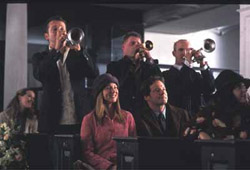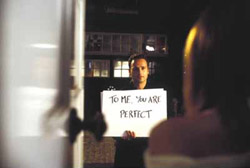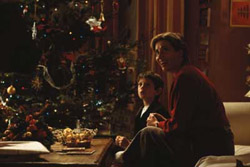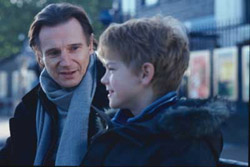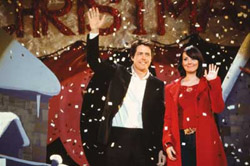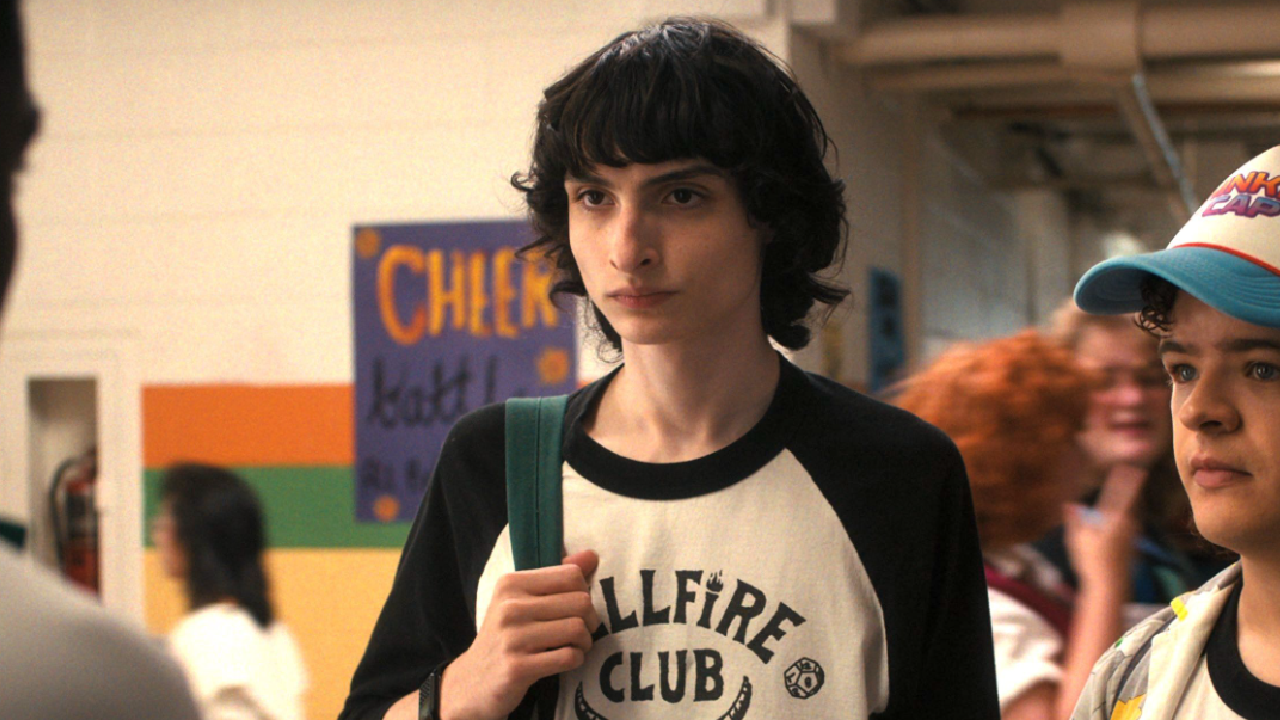Love actually is everywhere. So claims the latest film from Writer/Director Richard Curtis (writer of Four Weddings and a Funeral, Notting Hill) before setting out to prove its point by shining a flashlight into the lives of a large group of quirky and loosely connected characters facing life changing decisions about love.
The cast is huge and so is the star power Love Actually pulls. Appearing in one form or another are all the British regulars like Hugh Grant, Liam Neeson, and Emma Thompson along with a few Americans like Laura Linney and Denise Richards taking ensemble or cameo roles. There isn't exactly a lead role, just an equally distributed cast of ultra-famous and little knowns thrown together in interwoven crisis of love. Every facet of that emotion is examined in all its forms. In Love Actually, love triumphs, love fails, love begins, love reaches its end, love is born anew. Love breaks bonds and forges new ones. Love destroys lives and brings hope. It's all there, wrapped in a perfect Christmassy bow.
Yes, Love Actually is another romantic comedy, but distinguishes itself from the usual rom-com pack by being the first one this year worth seeing. It is also a Christmas movie and a very adult one. You might have noticed that Christmas movies generally cater to children, or if they do manage an "R" rating, still carry some message of family, or Christmas as it relates to kids. That's simply because Christmas is best suited for the toddler toting crowd. Big fat men running around in fake beards isn't the most adult way to celebrate a holiday after all... though perhaps life might be more fun if it was. However, Love Actually's take on the holiday season is an extremely adult one, bringing the world of relationships and adult confrontations into the land of St. Nick. Love leaves the kids and Santa at home to wash down his sleigh.
In his first actual stint in the Director's chair, Curtis displays a talent for quickly creating recognizable and memorable characters, even though the film itself flips back and forth between multiple stories without stopping to spend much time on any one face. A new British Prime Minister (Hugh Grant) is elected, and finds himself attracted to a staffer. A newly widowed step-father (Liam Neeson) tries to build a relationship with the step-son he must raise alone, and in the process teach him the intricacies of love. A newly married bride (Keira Knightly) discovers her husband's best friend (Andrew Lincoln) is secretly in love with her. A happily married executive (Alan Rickman) encourages employee romance in his workplace, while being tempted away from his wife (Emma Thompson) by a younger woman. A novelist (Colin Firth) catches his brother with the woman he loves, and flees to France where he falls for his housekeeper (Lucia Moniz), a woman whose language he cannot speak. A washed up rock star (Bill Nighy) attempts to launch a comeback by pushing a horrible re-rendering of one of his classics into a Christmas song. His only marketing strategy is to, in a hilarious turn, beg for people to buy it while admitting it is total crap. Then there?s two body doubles who develop a mutual attraction while filming substitute nudity on a second tier movie set. Crammed in around these are still more smaller stories winding in and out of Curtis' complicated narrative, each connected in some co-incidental way to the other.
Each of these is of course, utterly fragmentary, smashed as they are in a limited time frame in which to engage the audience. Less might have been more, and some of this ought to have been cut to give a little more time where it was needed. For instance Grant's Prime Minister character spends a lot of time off the subject, doling out anti-American political fodder that seems to have been included more because the Director wanted to slip in a political statement rather than having anything to do with the film itself. Maybe that time could have been used to wrap up a few unaddressed plot points? Most threads are tied up in a suitably satisfying fashion, but some, such as the status of Rickman and Thompson's marriage are simply left hanging. Good though it may be, in some ways, I get the sense that Love Actually wishes it was P.T. Anderson's much better Magnolia, set as it is on bringing so many disparate stories together, right down to doing so with unifying musical cues. In the end, despite Curtis' absolutely heroic efforts, Love never seems to have the necessary deftness to reach that high a plateau.
Still, what's there resonates with perfect sentimentality. For what it's worth, Love Actually is emotionally manipulative, but pleasantly so. It?s impossible NOT to get caught up in these stories when Curtis and his movie are so obviously in love with well? love. There?s happiness to be found in a movie unafraid to delve into both the bleak and beautiful aspects of romance and come out with a theme that brings all of that together.
